6 Liver Cleansing Foods and Herbs for Cellular Rejuvenation and Detoxification
BY MARIA TRANSITO LOPEZ LUENGO
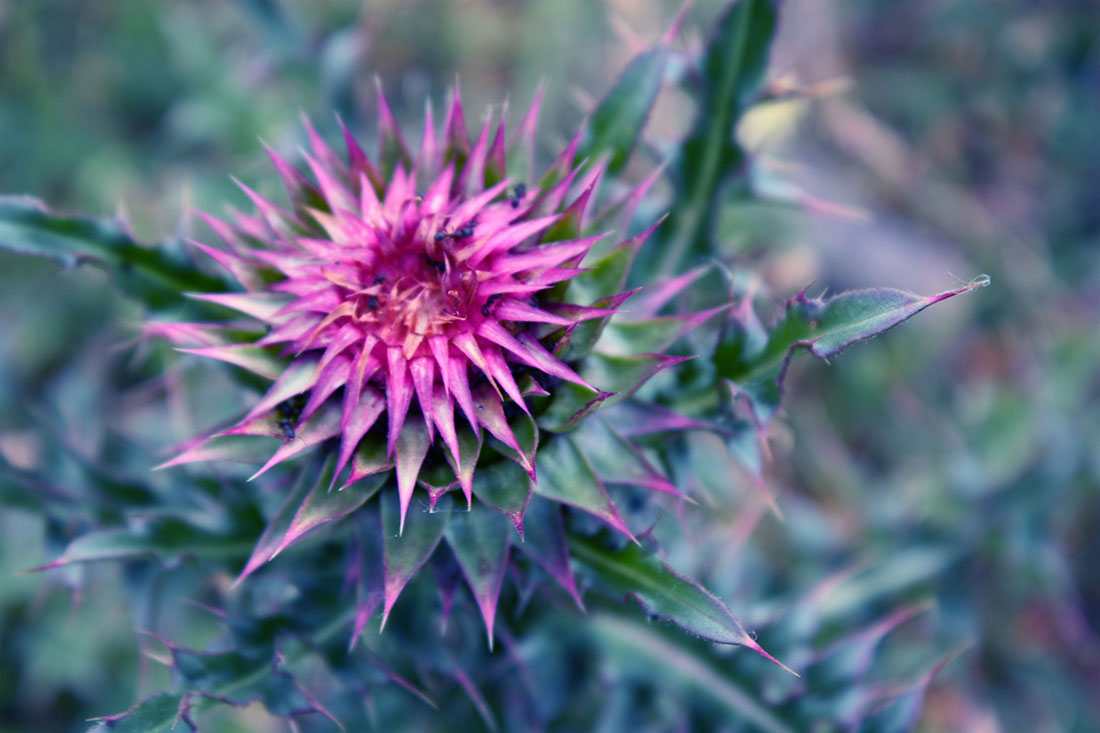 it’s extremely important to regularly consume liver cleansing foods and herbs to keep the body free of toxins and functioning optimally. photo: dia
it’s extremely important to regularly consume liver cleansing foods and herbs to keep the body free of toxins and functioning optimally. photo: dia
Editors Note: One of the most important organs in the body for our overall health and wellbeing, we often think of the liver primarily as a detoxification organ—and it most certainly is—however, it also manufactures and regulates hormones, controls fat storage and energy production, creates proteins, cleanses the blood, plays a critical role in digestion and regulates the supply of essential vitamins and minerals, among many other things.
Case in point, if your liver is out of balance, overly toxic or under-functioning in any way, shape or form, your entire mind-body system will suffer as a result. That means low or depressed mood, low energy, skin problems, diminished sex drive, poor digestion, brain fog/mental sluggishness and a host of other symptoms. On the other hand a well cared for and properly functioning liver (which can be accomplished through the ingestion of the liver cleansing foods and herbs listed below) will support lasting energy throughout the day, feelings of happiness and joy, increased mental clarity and functioning, strong digestion, healthy eyes, hair, skin and nails, increased libido and generally radiant health and wellness.In Traditional Chinese medicine philosophy, the liver is an important regulator of ‘Qi’ in the body, which loosely translates to ‘life-force energy’ or ‘vital energy’, which is believed to be the energy that sustains life itself. As such, proper liver health is essential to our deepest sense of vitality and aliveness. The Chinese also believe that the organs are closely related to our emotional health and that liver imbalances cause us to more frequently experience anger and frustration, among others.
As such, the inclusion of special liver cleansing foods and herbs are regularly called for in Traditional Chinese medicine practices as well as in Western herbal traditions and nearly every indigenous culture on the planet. By making these powerful liver cleansing herbs and foods a regular part of your diet and lifestyle, you can quickly restore functioning of your liver to optimal levels and ensure radiant lifelong health and wellness.
Liver Cleansing Foods and Herbs for
Lifelong Health and Wellness
1. Chicory (Cichorium intybus)
Stimulates appetite and improves digestion
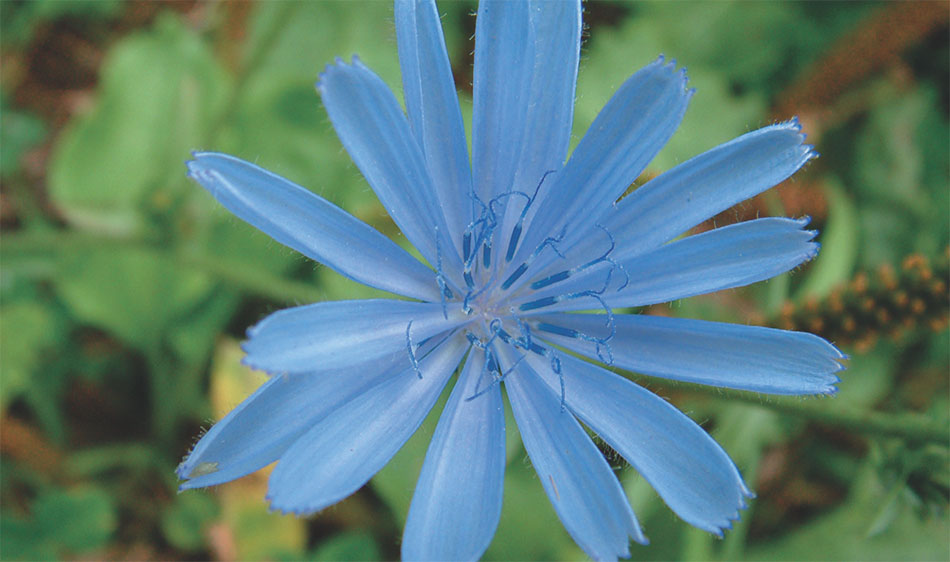 also known as the common appetizer endive, this powerful liver cleansing food doubles as a medicinal tonic herb.
also known as the common appetizer endive, this powerful liver cleansing food doubles as a medicinal tonic herb.
This liver cleansing plant has popularized vegetables such as escarole or endive. Its leaves are used for both culinary and medicinal purposes. Furthermore, its dried root can be a healthy coffee substitute. As a vegetable, it is very easy to prepare it. Pair with other foods that counteract its particular bitter taste to make delicious and refreshing salads with nutritional and medicinal properties.
When should you use it?
Whether fresh or dry, use it before meals—its components help to stimulate the appetite of children and adults, and strengthen the digestive system. Thanks to its lactucopicrin, responsible for the bitter taste of chicory leaves, it also has a cholagogue effect; that is, it facilitates emptying the gall bladder and therefore improves food digestion. Thus, it clears the liver and improves its functions. Chicory is recommended for those suffering from gallbladder and liver disorders and slow digestion.
Its mild laxative action also treats chronic constipation, and its mild diuretic effect helps prevent water retention. Dried chicory root is used as a coffee substitute, with the advantage that it is a digestive infusion without any stimulants.
Presentation
Use its freshly picked leaves in salads or fresh juice. Its juice is very bitter but very effective for stimulating appetite. Use its fresh or dried root for preparing decoctions (2 teaspoons per cup). The root is also available dried and crushed for preparing coffee substitute (dried, roasted, and ground). It can also be found in liquid extract (2 to 6 drops per day split into multiple doses).
Chicory Remedies
By Itself
Digestive decoction: mix a cup of water with 2 teaspoons of chicory root and boil it for 5 minutes. Let it steep for 10 minutes and strain. Drink up to 3 cups a day, before meals, to stimulate your appetite and digest your food well.
Conscious Lifestyle Recommends
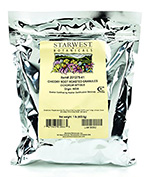 Starwest Wildrcrafted Roasted Chicory Root Granules
Starwest Wildrcrafted Roasted Chicory Root Granules
Starwest offers a high quality, wildcrafted chicory root granules conveniently roasted for easy use making teas and decoctions for liver cleansing. Starwest is one of the planets most respected suppliers of organic and wildcrafted herbs. Tastes great and easy to use.
2. Artichoke (Cynara scolymus)
Cares for the liver and lowers cholesterol
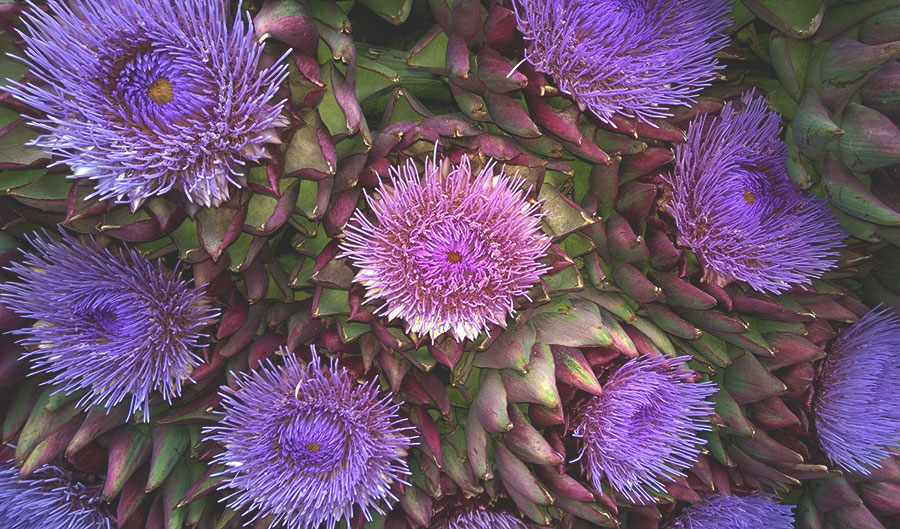 artichokes are a delicious liver cleansing food that are highly nutritious and versatile in the kitchen while still having a distinct medicinal benefit.
artichokes are a delicious liver cleansing food that are highly nutritious and versatile in the kitchen while still having a distinct medicinal benefit.
Although previously it had not been given much importance as a medicinal plant, from the twentieth century on, it has begun to enjoy a reputation as a remedy for liver cleansing and biliary disorders. In fact, some of its active ingredients are included in pharmaceutical products for liver health.
When should you use it?
Both its leaves and stem, whether fresh or dried, are an excellent remedy for liver damage and biliary diseases, besides being hepatoprotectve (that is, it protects the liver from toxins). It is cholagogue and choleretic, which promotes good digestive functions.
It is a highly recommended remedy for slow digestion and liver failure. It is also diuretic, purifying, and contributes to the elimination of urea, so it is beneficial for those suffering from kidney failure. Artichoke also helps lower blood cholesterol levels.
Presentation
The most common way of benefitting from its medicinal properties is by eating fresh artichoke heads. Besides eating artichokes, you can prepare fresh juice using fresh leaves; drink it immediately, because you can only keep it for a few hours.
For making infusion (1 teaspoon per cup) you can easily find its leaves, dried and chopped. Use it in tincture (1 teaspoon [6 milliliters] every 8 hours), ampoules (with the liquid extract), and capsules (dry artichoke or extract powder).
Remedies
By Itself
Infusion for proper digestion: add a teaspoon of leaves to a cup of boiling water. Let it steep for 10 minutes and strain. Drink it half an hour before meals. It can be sweetened with sugar or honey.
Combined
Regulatory hepatic infusion: mix equal parts of the liver cleansing herbs boldo, artichoke, and thistle. Mix a teaspoon of this mixture per cup of boiling water and let it steep for 10 minutes. Then strain it and drink 3 cups a day, half an hour before meals.
Conscious Lifestyle Recommends
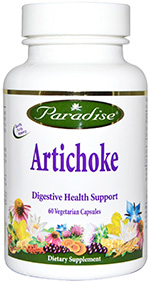 Paradise Herbs Artichoke Extract
Paradise Herbs Artichoke Extract
Paradise Herbs offers an ultra high quality, full spectrum artichoke leaf extract grown without the use of any chemicals and pesticides. Their special low temperature extraction process preserves all sensitive liver cleansing medicinal compounds just as nature intended.
3. Boldo (Peumus boldus)
Great friend of the gallbladder
 boldo is a powerful liver cleansing herb used for millennia by indigenous peoples in chile. photo: marco diaz
boldo is a powerful liver cleansing herb used for millennia by indigenous peoples in chile. photo: marco diaz
The native people of Chile, in the Andes, used boldo leaves as a remedy for stomach and digestive disorders. Today, it is a very common remedy in pharmacies and health food stores. In fact, it is one of the most widely used medicinal plants for pharmaceuticals that treat gallbladder disorders.
When should you use it?
This remedy’s most important virtues are its ability to protect the liver and its effectiveness in increasing the production of bile in the liver (choleretic effect) and to facilitate emptying of the gallbladder (cholagogue effect). Boldo leaves are especially recommended for problems with gallbladder function, such as slow or difficult digestion, bloating, and bad taste in the mouth (bitterness), caused by malfunctioning gallbladder. In addition, it is a gentle yet effective laxative that helps fight chronic constipation.
PresentationMost commonly, dried and chopped boldo leaves are used for preparing infusions (one teaspoon per cup). But it is very often combined with other choleretic and cholagogue plants or laxatives. It is also sold in capsules in dosages recommended by the manufacturer.
Furthermore, its active ingredients are extracted from boldo bark and used in certain pharmaceuticals for treating liver and gallbladder diseases.
Boldo Remedies
By Itself
Infusion for biliary dyspepsia: place a teaspoon of leaves in a cup of boiling water. Let it steep for 10 minutes and strain. Drink up to 3 cups a day, half an hour before meals.
Combined
Liver decongestant tea: mix equal parts liver cleansing herbs boldo, fumitory, rosemary, dandelion, and anise. Place 2 teaspoons of this mixture in a cup of boiling water. Let it steep for 10 minutes and strain. To improve liver function, drink up to 3 cups before meals.
Conscious Lifestyle Recommends
![]() Amazon Therapeutics Organic Boldo Tincture
Amazon Therapeutics Organic Boldo Tincture
This ultra-high quality organic bold extract is in tincture form for easy consumption. Sourced from the plants native regions in the mountains of Chile and Peru, Amazon Therapeutics Boldo tincture is a powerful natural medicine for protecting and cleansing the liver. Full spectrum extract for maximum efficacy.
4. Milk thistle (Silybum marianum)
Potent liver regenerator
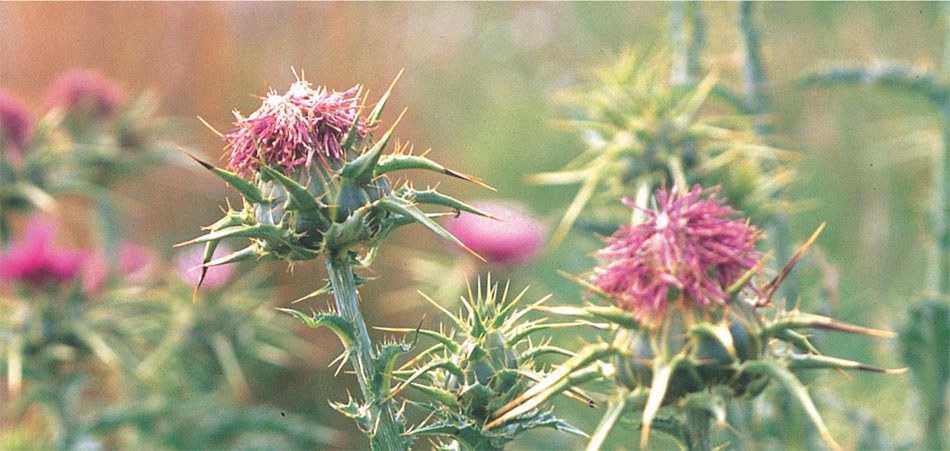 milk thistle is a powerful liver cleansing food and herb that grows wildly throughout north america and europe. photo: farbmeister
milk thistle is a powerful liver cleansing food and herb that grows wildly throughout north america and europe. photo: farbmeister
Thistle is native to Mediterranean temperate zones, where it has been used since ancient times. In many regions, it is a traditional winter vegetable served at Christmas parties. It has a delicate, sweet, and slightly bitter flavor. Although it is not very rich in nutrients, it provides other active components, such as silymarin and inulin, to which it owes its medicinal properties.
When should you use it?
It is one of the most effective remedies for protecting and healing the liver because it contains silymarin, a substance capable of regenerating liver cells damaged by toxins and relieving liver tissue inflammation. Milk Thistle is therefore an excellent remedy for hepatitis and liver failure. It is also used to treat liver disorders caused by insufficient bile secretion, such as gallstones and biliary dyspepsia. It has good hepatoprotective effects to relieve symptoms related to overeating, and alcohol and drug abuse. As if this were not enough, thistle also stimulates appetite, it is diuretic, has a mild laxative effect, and helps reduce high cholesterol levels because it has lipid-lowering activity. In addition, it can be used externally as an anti-inflammatory to relieve sunburn and dermatitis.
Presentation
It is available in tinctures (1/4 to 1/2 teaspoon [1 to 2 milliliters] every 8 hours), liquid extract (20 to 30 drops, 2 or 3 times a day), and dried and ground for preparing infusions. It is pulverized into capsules whose dosage is indicated by the manufacturer. Moreover, silymarin is extracted from the fruits of milk thistle, and it is an ingredient in multiple liver medications.
Remedies
By Itself
Decoction to maintain a healthy liver: add a teaspoon and a half of thistle to a cup of water and boil it for 2 minutes. Let it steep for 5 minutes and strain. Drink 2 or 3 cups a day before meals for good liver function.
Combined
Hepatoprotective tea: Mix equal parts liver cleansing foods milk thistle, rosemary, and boldo. Add a teaspoon of this mixture to a cup of boiling water, and let it steep for 10 minutes. Strain it and drink it before meals. This tea helps to relieve the liver after overeating.
Conscious Lifestyle Recommends
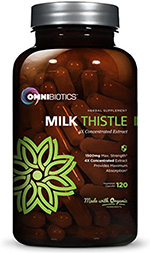 Omnibiotics Organic Milk Thistle Extract
Omnibiotics Organic Milk Thistle Extract
Omnibiotics offers a high potency, concentrated 4:1 milk thistle extract in a vegetarian capsule, free of synthetic ingredients and low quality binders. High in glutathione stimulating silymarin for maximum liver cleansing and hepatoprotective properties.
5. Dandelion (Taraxacum officinale)
Great ally of the liver and kidneys
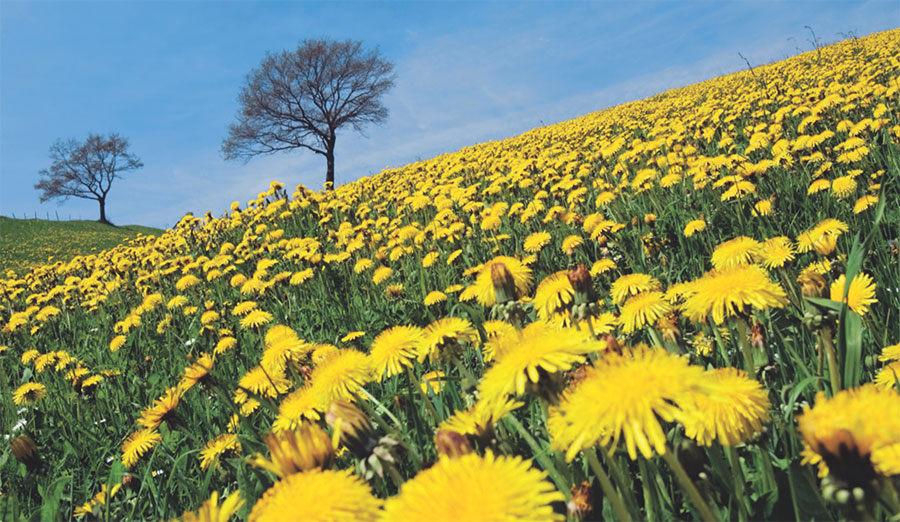 dandelion are weed-like flowers that grow wildly through the world and double as a powerful liver cleansing food and herb, making great additions to salads and juices and are readily available at most markets.
dandelion are weed-like flowers that grow wildly through the world and double as a powerful liver cleansing food and herb, making great additions to salads and juices and are readily available at most markets.
It is a very common plant that has many beneficial health properties, but it is most known as an ordinary “weed.” Its fresh leaves can be eaten in salads, and their great purifying power makes dandelion an essential element in detoxifying cleanses. It is a great ally for liver and kidney health, but it is also essential in weight loss because of its low caloric content and satiating effect.
When should you use it?
It is very beneficial for the liver because it increases bile production (choleretic) and facilitates emptying of the gallbladder (cholagogue). So it is one of the most beneficial plants for liver disorders and gallbladder malfunction. It also has the ability to stimulate the appetite, aid digestion, and exert a mild laxative effect for preventing constipation. Used orally as herbal tea, fresh salad, or two or three tablespoons of fresh juice before meals, it has a diuretic and cleansing effect, which is highly recommended for preventing water retention and for removing calcium oxalate crystals to prevent kidney stones. This, together with its important work in supporting the liver, makes it an effective treatment against eczema, rashes, and boils, which are often caused by autointoxication. Dandelion is often recommended when seasons are changing. It is an effective treatment for overeating, which makes it useful for weight control. Moreover, applying it externally as a poultice helps heal wounds and bruises.
Presentation
Its freshly picked leaves can be used to prepare a fresh juice, using a blender, and then added to a salad. If you cannot get it fresh, it is available as troches (dried and ground) or in teabags, ready for preparing infusions and decoctions; it also comes in (1/2 to 1 teaspoon [2 to 5 milliliters] every 8 hours), liquid extract (3/4 to 2 teaspoons [4 to 10 milliliters] every 8 hours), and capsules (powdered or dry).
Remedies
By Itself
Digestive and liver cleansing infusion: add a teaspoon of dandelion to a cup of boiling water. Let it steep for 10 minutes and strain. Drink 3 cups a day, half an hour before meals. This remedy not only helps with digestion, but it cleanses the entire body.
Combined
Hepatoprotective and diuretic infusion: mix equal parts liver cleansing foods boldo, artichoke, dandelion, and peppermint. Add a teaspoon of this mixture to a cup of boiling water and let it steep for 10 minutes. Strain it and drink it before meals. It will help good digestion and facilitate excretion of waste substances.
Conscious Lifestyle Recommends
![]() Oregon’s Wild Harvest Organic Dandelion Root
Oregon’s Wild Harvest Organic Dandelion Root
Oregon’s Wild Harvest offers a 100% pure dandelion root powder for easy absorption and consumption of this powerful liver cleansing food. 100% vegan capsules deliver the dandelion powder effortlessly to avoid its bitter taste for those who don’t like herbal medicines.
6. Fumitory (Fumaria officinalis)
Clears the liver and purifies the body
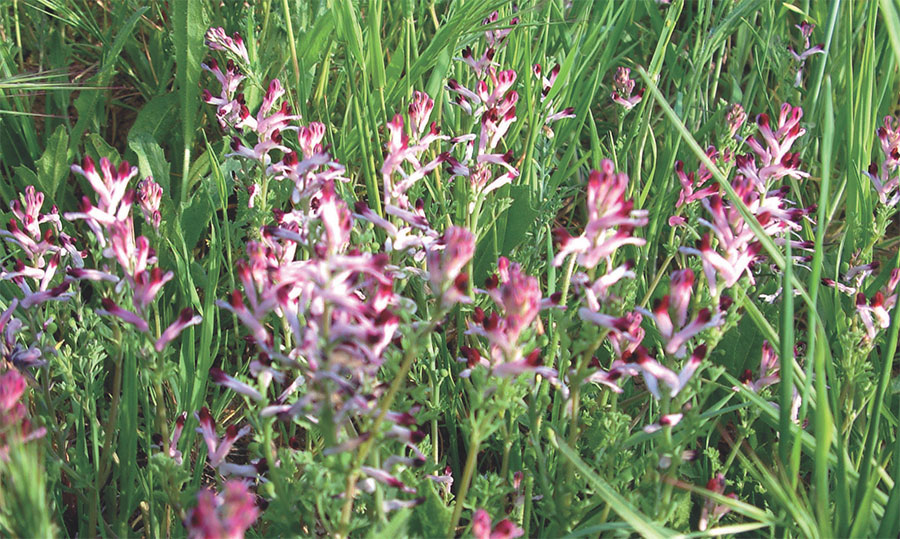 a sacred, somewhat mystical liver cleansing herb that has a number of beneficial effects on the body.
a sacred, somewhat mystical liver cleansing herb that has a number of beneficial effects on the body.
The word “fumitory” comes from the Latin fumus (“smoke”), although it is not known whether it is because when it is crushed it makes you cry just as smoke does, or because its leaves resemble the smoke from a fire. In fact, old sorcerers believed that when this plant was set on fire, its smoke would drive away evil spirits.
When should you use it?
It has antispasmodic, diuretic, and cleansing properties, but what stands out most is its ability to promote smooth gallbladder function, from its cholagogue and choleretic effect, significantly improving the digestive process. Fumitory is recommended to relieve heavy and difficult digestions, migraines, and intestinal spasms. Used externally, it is a good emollient for relieving eczema and rashes.
Presentation
Collect it in the wild, then dry it in the shade, and keep in tightly closed glass containers, away from light. You can find it in troches (dried and ground), ready for making tea. It is also possible to buy it as fluid or dry extract and in capsules, the latter being the most practical because its dosage, indications, and expiration date are specified by the manufacturer.
Remedies
By Itself
Digestive infusion: add 1 teaspoon of fumitory to a cup of boiling water. Let it steep for 10 minutes and strain. You can sweeten it with honey or sugar, and then drink 3 cups a day before meals.
Combined
Herbal tea for gallstones: mix equal parts liver cleansing foods and herbs boldo, dandelion, peppermint, and fumitory. Place a teaspoon of this mixture into a cup and add boiling water. Let it steep for 10 minutes and strain. Drink 3 cups a day to digest fats and remove toxins, for treating gallstones.
Conscious Lifestyle Recommends
![]() Hawaiipharm Wildcrafted Fumitory Tincture
Hawaiipharm Wildcrafted Fumitory Tincture
Highly absorbable, highly concentrated fumitory liquid extract, which allows more of the plants medicinal liver cleansing compounds to be fully bioavailable. The bitter taste of this liver herb instantly stimulates digestion for use before, during or after meals.
This article on liver cleansing foods and herbs is excerpted from Medicinal Plants at Home: More Than 100 Easy, Practical, and Efficient Natural Remedies by María Tránsito López.
About The Author
María Tránsito López Luengo is a pharmacologist, dietitian, and herbal medicine expert. She has published several articles and books on medicinal plants and natural nutrition. She lives in Barcelona, Spain.







